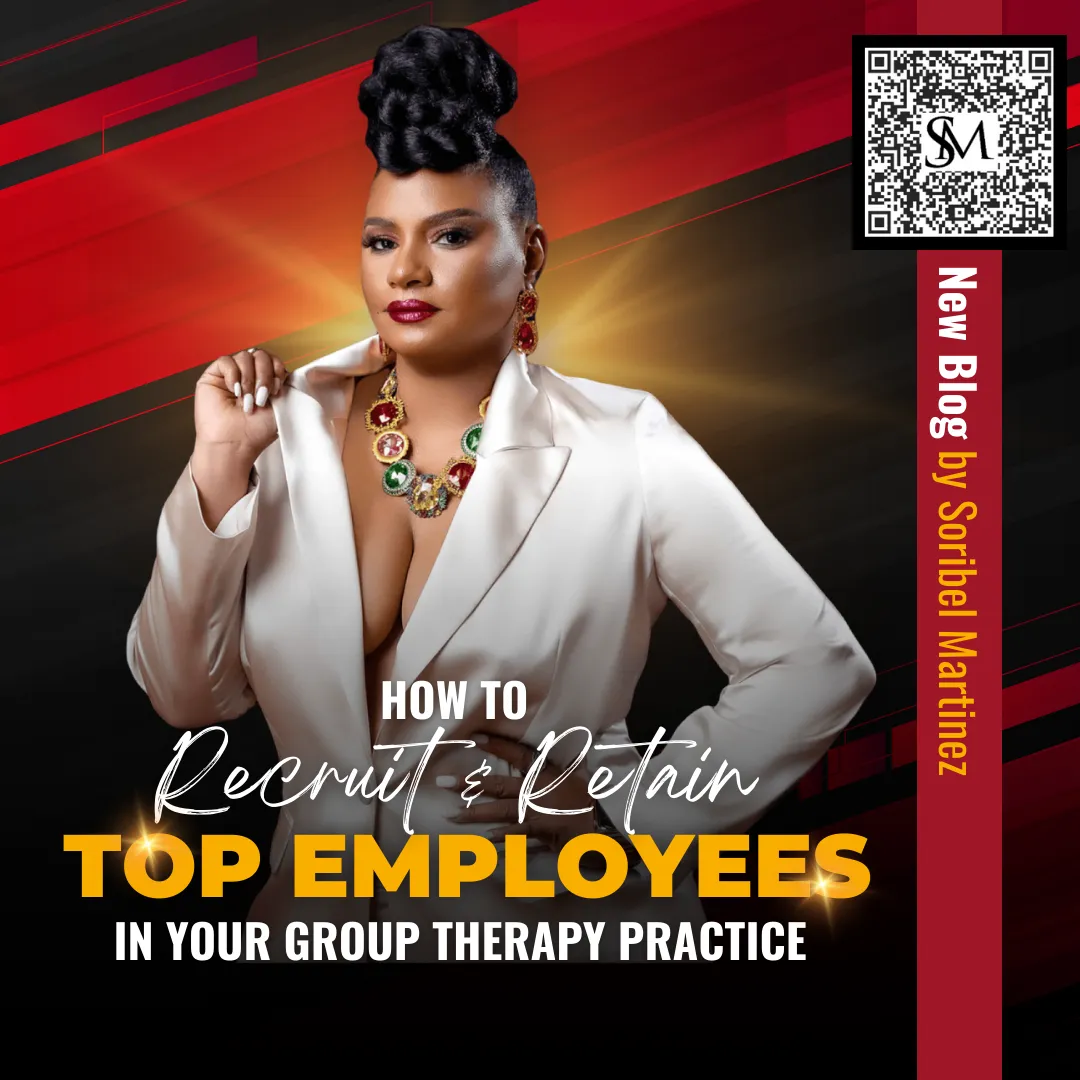How to Recruit and Retain Top Employees in Your Group Therapy Practice
Recruiting and retaining the best people for a group mental health practice is crucial for success. This involves recruiting skilled professionals and managing the financial and organizational aspects. To streamline your hiring process, focus on the following components:
- Develop a Strong Employer Brand
- Define Your Needs
- Ensure Competitive Compensation and Benefits
- Implement Effective Recruitment Strategies
- Develop Effect Onboarding and Training Procedures
- Continue Employee Engagement
- Consider Your Next Steps Toward Success
With these recruitment efforts in place, you can fill open positions with the right candidates and take your practice management skills to the next level.
Develop a Strong Employer Brand in Your Group Therapy Practice
In the competitive landscape of mental health services, a strong brand can set your practice apart and attract the best potential candidates. When potential employees recognize your brand as reputable, compassionate, and dedicated to patient care, they are more likely to apply for positions within your organization.

- Aligning with Values and Mission: Employees, especially those in the healthcare sector, seek organizations aligning with their values and professional mission. A well-defined brand that reflects your company culture can resonate with potential hires who share these values.
- Fostering Employee Pride: Employees want to work for organizations they are proud of. A strong brand can instill a sense of pride and belonging among your team members. When employees feel connected to the brand and its mission, they are more likely to stay and contribute to the practice’s success.
- Building Credibility: Group practice owners with credibility will have a better chance of having top job seekers pursuing them. Having qualified candidates actively seeking employment with you can make the recruitment process more manageable.
Define the Needs of Your Group Mental Health Practice
Defining your needs is crucial in recruiting and retaining top employees in a group mental health practice. These steps lay the foundation for effective planning, resource allocation, and decision-making. Be sure to focus on the following:
- Role Clarification: By defining the need, you can determine the roles and responsibilities of the new hires. This clarity helps identify the qualifications, skills, and experience required for each position, making the recruitment process more targeted and efficient.
- Workforce Planning: Defining the need allows for strategic workforce planning around client and organizational needs. You can assess whether you need additional clinicians, administrative support, or leadership roles and plan your hiring accordingly.
- Patient Satisfaction: Meeting the needs of your patients is paramount. By defining the need for specific roles or skill sets, you can improve patient care and satisfaction, which can lead to the retention of both patients and employees.
Ensure Competitive Compensation and Benefits in Your Group Therapy Practice
Mental health professionals are in high demand, and offering an attractive compensation package is crucial for attracting and retaining the best talent. To ensure competitive compensation and benefits, consider implementing the following:

- Market Research: Regularly research to understand the compensation and benefits of similar practices in your area. This helps you stay competitive.
- Tailored Packages: Customize compensation packages to the unique needs and preferences of your employees. Consider offering perks such as flexible benefits options to accommodate diverse needs.
- Transparency: Be transparent about compensation structures, including base salaries, bonuses, and any performance-based incentives. Clear communication builds trust.
- Non-Monetary Benefits: Besides competitive salaries, consider offering non-monetary benefits like professional development opportunities, a supportive work environment, and a healthy work-life balance.
- Employee Input: Solicit input from employees regarding their compensation and benefits preferences. This can help tailor packages to their needs and increase satisfaction.
- Wellness Programs: Offer wellness programs to support your employees’ physical and mental health. This can contribute to their overall well-being and job satisfaction.
Implement Effective Recruitment Strategies for Your Group Mental Health Practice
Once you lay these foundations, it is time to implement your effective recruiting strategy. Recruiting top professionals is the foundation upon which a successful practice is built. To ensure effective recruitment in a group mental health practice, consider the following strategies:
- Clear Job Descriptions: Develop comprehensive job descriptions that clearly outline the roles, responsibilities, and qualifications required for each position. Job postings should define precisely what resumes you are seeking.
- Multiple Resources: Implement your recruitment process through the use of multiple options. These can involve social media, LinkedIn, job boards, Indeed, job fairs, and recommendations from current employees.
- Candidate Assessment: Implement a thorough candidate assessment process, which may include a virtual or in-person interview process, skills assessments, and reference checks, to evaluate candidates’ qualifications and cultural fit.
- Networking and Partnerships: Establish partnerships with academic institutions, professional organizations, and other healthcare providers to tap into talent pipelines and referral programs.
Develop Effect Onboarding and Training Procedures in Your Group Therapy Practice
When top-level employees have been found and hired, the job is far from over. Onboarding and training are essential components of retaining top employees. They play a significant role in shaping the success and longevity of your workforce. To implement onboarding and training procedures with functionality, consider the following best practices:
- Customized Programs: Tailor your onboarding and training programs to meet the specific needs of your practice and the roles of your employees. One size does not fit all, so ensure the content is relevant to each position.
- Mentorship and Preceptors: Pair new employees with experienced mentors or preceptors who can provide guidance, answer questions, and facilitate a smoother transition into their roles.
- Feedback Mechanisms: Establish feedback mechanisms to gather employee input about the effectiveness of training programs. Use this feedback to make improvements and adjustments as needed.
- Online Resources: Consider offering online resources and e-learning modules that employees can access conveniently. This can be especially useful for ongoing training and development.
- Compliance Training: Ensure that all employees receive comprehensive training on compliance, ethics, and legal requirements relevant to mental health practice.
- Regular Updates: Periodically update training programs to reflect changes in the field, regulations, and emerging best practices.
- Measurement and Evaluation: Assess the impact of training programs through evaluations, tests, and performance metrics to ensure that they are achieving their intended outcomes.
Continue Employee Engagement in Your Group Therapy Practice
The final step in recruiting and retaining top talent is employee engagement. Staying in touch with employees can increase job satisfaction, resolve problems, and keep employees with your organization for years to come. To foster employee engagement, focus on the following:
- Open Communication: Create a culture of open and transparent communication where employees feel heard and valued. Encourage feedback and actively address concerns.
- Recognition and Appreciation: Acknowledge and appreciate employees’ contributions and achievements regularly. Simple gestures like thank-you notes, awards, or verbal recognition can go a long way.
- Professional Development: Provide opportunities for professional growth and development, including training, mentorship programs, and career advancement pathways.
- Work-Life Balance: Encourage work-life balance by offering flexible scheduling, reasonable workloads, and support for managing stress and burnout.
- Wellness Programs: Implement wellness programs that promote physical and mental health. Employee well-being is closely tied to engagement.
- Involvement in Decision-Making: Involve employees in decision-making processes when appropriate. This can give them a sense of ownership and investment in the practice’s success.
- Team Building: Organize team-building activities and events to strengthen team members’ relationships and create camaraderie.
- Feedback and Performance Reviews: Conduct regular performance reviews and provide constructive feedback to help employees improve and grow.
- Leadership Development: Invest in leadership development programs to groom internal talent for leadership roles, demonstrating a commitment to employees’ career progression.
- Monitor Progress: Monitor progress toward improvement goals and adjust strategies as needed. Improvement efforts should be dynamic and responsive to changing circumstances.
- Documentation: Maintain records of improvement initiatives, outcomes, and lessons learned. Documentation ensures the practice can build on past successes and avoid repeating mistakes.
- Celebrate Successes: Celebrate and communicate the successes and positive outcomes resulting from continuous improvement initiatives. This helps build enthusiasm and commitment to the process.
By combining effective management, financial, and recruiting strategies, your practice setting can attract and retain the best talent while ensuring the practice’s long-term financial stability and success. This holistic approach will help you build a solid and capable team while maintaining a healthy bottom line.








